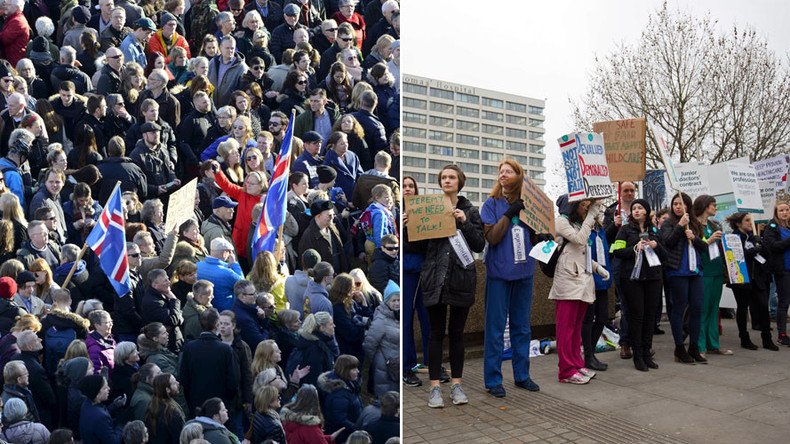A tale of two protests: Icelanders take to the street, Britons take to keyboards

Revelations that British Prime Minister David Cameron profited from his late father's investment in the offshore haven of Panama set social media platforms alight last week.
The idea that the country's leader, who'd bemoaned mere entertainers from profiting from these types of financial settlements, first shocked Britons and then angered them.
It angered them because since his first term in office back in 2010, Cameron launched an austerity plan designed to restore the country's ailing economy, seriously affected by the financial crisis of 2008.
It angered them because, though an aristocrat from an incredibly privileged background, 'Dave,' as he likes to be called, insisted austerity would apply to everybody and that ultimately all of the Kingdom's subjects “were in it together.”
As the leak of over 11 million files proved, the leader of Britain was certainly not “in it” with the disabled and marginalized people his policies targeted, by cutting their benefits and forcing them into increased poverty.
He was however “with” a plethora of celebrities and royal figures that would astutely place their wealth in protected funds, allowing them to rise in value without making the average tax-paying citizen profit from these gains.
It has to be said that offshore investments are perfectly legal. A loophole in the law, which forces people to pay their taxes inside the country, allows them to avoid the cumbersome expense when those monies are transferred elsewhere, namely in offshore banks.
As pressure mounted on the premier, by the weekend he finally admitted to having profited from these arrangements, insisting however that he had done nothing wrong.
The British public however is adamant that something untoward happened and that while not illegal, his financial affairs are certainly immoral just as he'd described those of popular comic Jimmy Carr when it emerged that he'd placed his money away from the prying eyes of the tax man.
At the time, David Cameron, made scathing and unprecedented attacks on one of the country's most beloved entertainers who was forced to concede that he had indeed made these investments as was perfectly legal under UK law.
But while the PM himself is no stranger to the laws he was elected to uphold, he never the less insisted that this behavior was unacceptable and consequently launched a 'crusade' against those like Carr who were depriving Britons from much needed tax revenue.
In that context it becomes all the more astonishing that all the while Cameron himself was profiting from similar arrangements.
It is this flagrant hypocrisy that is angering many Britons. But while social media has been dominated by this latest political scandal, reaction on the British street remains subdued.
A protest on Saturday was held to call for a reduction in cuts to public services, however in light of the Panama revelations; it turned to appeals for the resignation of David Cameron.
Yet for all their adequate timing and reflection of the overall public mood, it must be said that these marches barely gathered a handful of people.
Fewer than 500 turned up, according to the most generous observers. Such a low turnout indicates that while Britons were busy hammering their frustrations on their keyboards and phones, they were certainly not angry enough to take to the street to express their outrage.
Contrast that with the small nation of Iceland where several thousand people went out to protest when it transpired that the now former PM Sigmundur Gaunlaugson had an offshore investment in the name of his wife which he'd failed to declare upon reaching office.
While again, Gaunlaugson’s arrangement was not illegal, the secrecy he displayed, in particular in a post financial crisis situation from which Iceland is yet to fully recover, means public opinion was adamant he had to go. In light of the scale of the protests which rallied a significant tranche of a population of merely 300 000, Iceland's premier resigned.
While 10 percent of the population is believed to have protested, in Britain that figure barely reached a paltry 0.002 percent. So why such apathy, when public outrage is almost palpable if the media in its entirety is anything to go by?
The answer no doubt lies at the hands of the steely former Conservative leader Margaret Thatcher who single-handedly crushed any notion of dissent during her notorious reign over Britain in the 1980s. Her year-long stand-off with the striking miners in 1984 pulverized the unions and ensured expressions of public opposition to politics in the shape of direct action would consequently be relegated to the past.
The country's working classes never recovered from such a bruising conflict from which they emerged at the time destitute.
Her introduction of the 'right to buy' scheme for council property had already eroded the sense of community that was prevalent among the country's low income families, and the plan, which in the short-term, provided millions of households with tangible assets, further divided the now fragile working class.
This in turn made it almost impossible for effective organization against authority.
A government friendly media
The British media landscape is equally dominated by a right-wing press that at the time boasted impressive circulating figures. The Murdoch paper The Sun at its height sold close to six million copies making it the paper of choice to court by leading public officials seeking election.
It, in turn, offered its politician of choice the adequate narrative that would ensure public support. This would often be translated in the demonization of any group of people looking to take to the streets to oppose government policy and throughout the late 80's and 90's public expression of dissent gradually disappeared.
Poll tax riots were said to have eventually lead to Thatcher's resignation, though it was her cabinet's 'betrayal' as she saw it that forced her out of Downing Street. The riots were crushed and the poll tax abandoned before being conveniently re-labeled council tax!
So much for historic riots.
'Wrong for the press to hound the PM' & 'there's no smoke without fire' some of the views on the streethttps://t.co/a9a4dFgcua
— RT UK (@RTUKnews) April 11, 2016
It was only until 2003 that Britons took to the street, in great numbers, once again. Described as the greatest march in history, gathering well over one million protesters, the anti-War march of that winter proved in the end to be perhaps one of the most disappointing.
While the number of people present was indeed inspiring, and the protest gave birth to a host of anti-war organizations and movements that exist to this day, the fact it was unable to stop the course of the Middle Eastern conflict left a bitter taste in the average Briton's mouth. It somehow indicated that for all of the people's efforts, politicians would simply look away and do their business irrespective of what the 'pleb' actually thinks.
No doubt further actions would have been necessary to send a strong message to a leader, admittedly intent on taking the country to war, but which still hadn't taken that fateful step.
But sadly Britons immediately returned to their everyday life. Gaining a fake sense of false achievement that they had participated in the greatest, yet most pointless march, in history.
Today, social media is the outlet of choice for those disgruntled people. Millions took the concept of that famous English 'letter of complaint' and adapted it to the digital era.
The witty Tweets and hilarious Facebook posts are testament to that great British revolutionary value: humor.
Its result is twofold. Users feel they have made their point and expressed their displeasure. Government figures are happy that that discontent remains in the living room, far away from the rebellious street.
Meanwhile Dave is still in No.10.
Never mind, let's have a nice cup of tea and then tweet about the sheer cheek of the man.
The statements, views and opinions expressed in this column are solely those of the author and do not necessarily represent those of RT.














